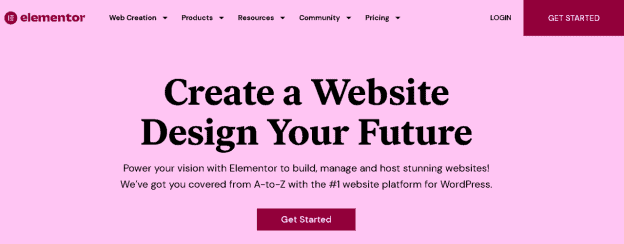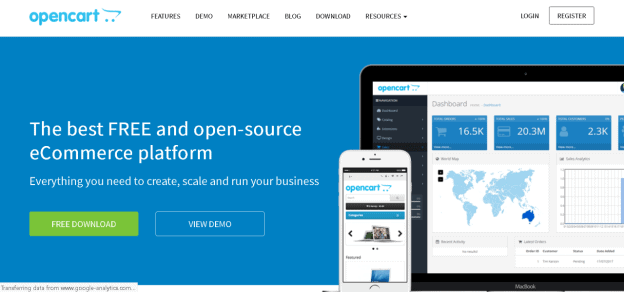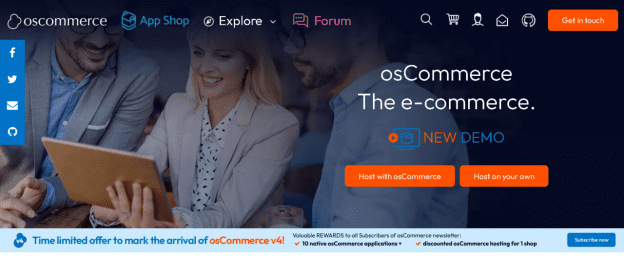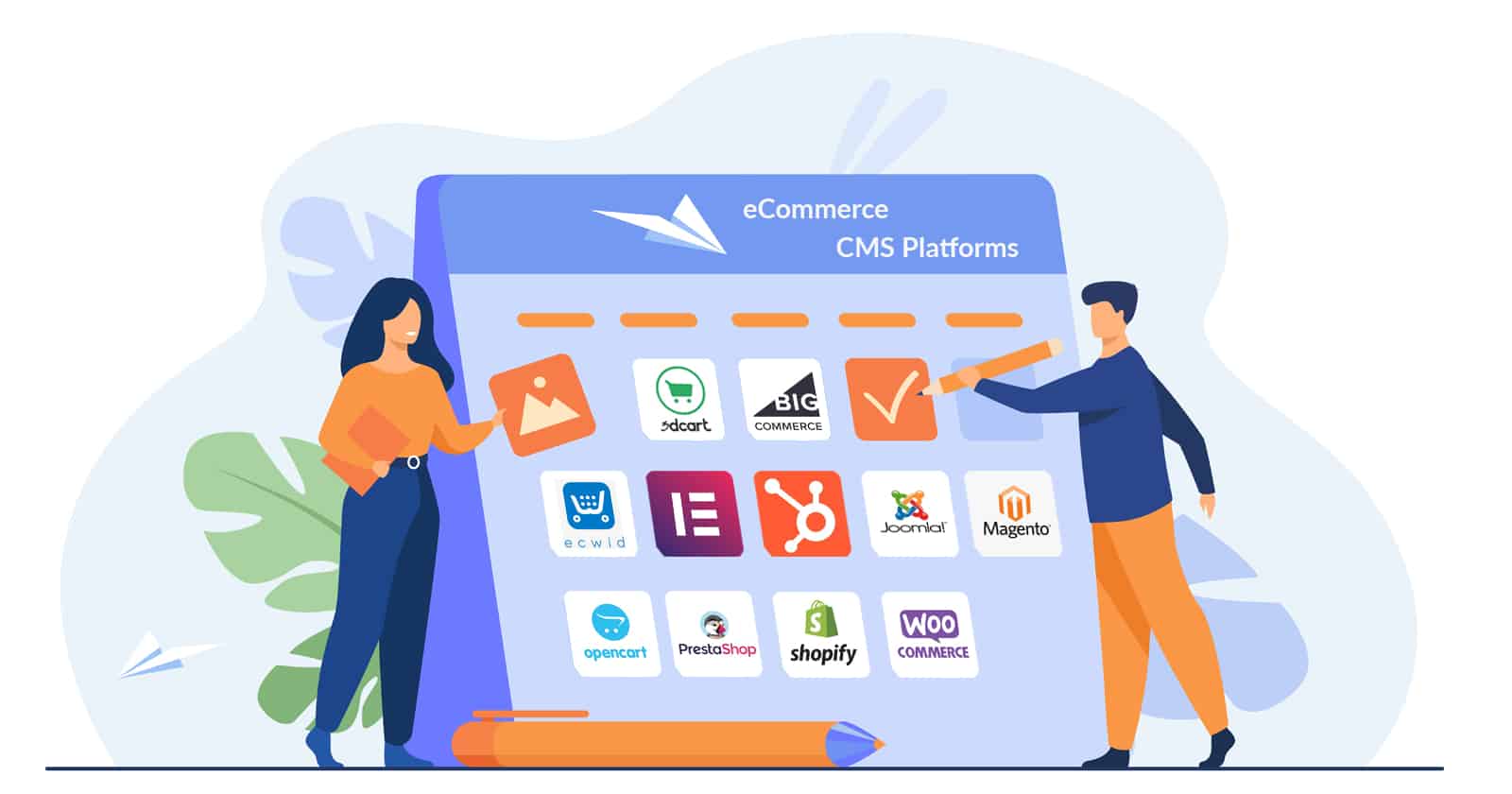In order to succeed in the world of online business, it is important to have a reliable and user-friendly eCommerce platform. There are many different CMS platforms available on the market, and it can be overwhelming to try to choose the right one for your company. To help you make a decision, we’ve compiled a list of 15 of the best eCommerce CMS platforms for small and medium businesses. Whether you’re just starting out or looking to upgrade your current system, these options will give you the tools you need to build a successful online store.
eCommerce Content Management System (CMS) is the software used by ecommerce solutions providers to develop ecommerce websites. It has in-built product catalogs, financial management, inventory, and payment gateways and is mostly used by Small and Medium Businesses (SMBs).
In 2021, eCommerce sales were about $4.9 trillion and it is expected to hit $5.5 trillion in 2022. This alone is enough to say where the online market is heading to. With more people willing to shop online even small businesses are moving into online mode. So why not you? In this post we will look in detail about the various eCommerce CMS platforms that are available and their features and benefits. Before starting an eCommerce business it’s important to understand the nitty gritty of the business.
Let us take a look at a few of the eCommerce CMS platforms available today in the market.

3dcart founded in 1997 was acquired by Shift4payments and renamed it Shift4shop. It is a great tool for small businesses to SEO upgrade their website. With more than 22,000 customers its software is very secure and reliable.
Features:
- Completely PCI compliant for easy acceptance of credit cards
- Easy to host and maintain software
- Constant updation of features and tools
- Free SSL certificate and Domain name
- Unlimited storage capacity
- Free migration assistance
Pricing:
- Basic – $29 /month
- Plus – $79 /month
- Pro – $229 /month
Click here to view the pricing page of 3dcart.

BigCommerce is a cloud based platform which is used by both small and big businesses. It has over 60,000 clients and is one of the most feature rich platforms. It has been used by Skullcandy, Toyota and a few other big companies.
Features:
- Provides centralized inventory management
- Can be integrated with all major payment platforms
- Built-in native blog and social media support
- Provides 320+ add-ons and various themes and templates
- Available in many languages
Pricing:
- Standard – $29.95 /month
- Plus – $79.95 /month
- Pro – $299.95 /month
Click here to view the pricing page of BigCommerce.

Ecwid is used in over 175 countries and is available in 50 languages. It was founded in 2009 to enable small businesses which already had websites and wanted to sell online. Because of this
Ecwid has one of the easiest CMS integrations with the original website.
Features:
- 50+ payment options and Point-of-Sale tools
- Marketing Automation can be done on the customer side
- Add new sales channels from Ecwid Control Panel
- Can sell subscriptions and offer discounts
- Can add digital and physical products
- Mobile app can be customised by customer
Pricing:
- Open Source – Free
- Venture – $12.50 /month
- Business – $29.17 /month
- Unlimited – $82.50 /month
Click here to view the pricing page of Ecwid.

Elementor is a WordPress-based web designing platform which accounts for more than 10 million active users which accounts for 7% of the internet. It goes by the phrase “WordPress on Steroids” which tells us how integrated it is with WordPress and using plugins is made very easy with this software.
Features:
- Drag & Drop editor helps you build without any coding knowledge
- Endless customisation options with WordPress integration
- 300+ Designer made Templates & 100+ Widgets
- Live & Responsive Editing where you can design for upto 7 devices
Pricing:
- Essential – $49 /year
- Expert – $199 /year
- Studio – 1st year – $299, From 2nd year – $499 /year
- Agency -$ 999 /year
Click here to view the pricing plan of Elementor.

HubSpot is one of the well known Content Management Systems out there and provides a lot of free tools in the demo version to get you started. Inbound Marketing is the motto by which it works and businesses who work around this concept will find its CMS very useful.
Features:
- Content Staging where creators can update by staging the changes
- HubDB datastore where you can create and store tables
- Supports Multi-language
- Developer Sandbox which consists of all tools
- File Manager
Pricing:
- Starter – $23 /month
- Professional – $360 /month
- Enterprise – $1200 /month
Click here to view the pricing page of HubSpot CMS.

Joomla is a free content management system used to manage content for small businesses, and non-profits with nearly 2 million active websites which accounts for 6% of the CMS market. Joomla is perfect for businesses who develop websites for customers. It also has a core package for developers who can use it to build Application bridges, Integrated e-commerce systems, Data reporting tools and many such applications.
Features:
- Numerous third party extensions in Joomla Extensions Directory
- Robust security conscious software
- Stable PHP framework used to write code for applications
Pricing:
- Free Open Source Software

Jumpseller is another one of the crowd favorite ecommerce platforms that has an easy way of setting up your online business. Formally called as Vendder, it was founded in 2010 and is one of the most used platforms in Latin America and hopes to expand to more countries in Europe.
Features:
- Dedicated design and support team
- Availability of numerous plugins and themes
- Automatic sales invoices
- Live chat with customer care available
- Social media integration
Pricing:
- Basic – $10 /month
- Plus – $19 /month
- Pro – $38 /month
- Premium – $76 /month
Click here to view the pricing page of Jumpseller.

Magento was acquired by Adobe and is managed by Adobe Commerce. Magento has open source and commerce editions. Magento Open Source enables the creation of web stores with minimal features at no cost. Magento Commerce is necessary for more sophisticated needs. Magento serves businesses of all sizes, including small, medium, and large businesses but may be a little bit hard to learn and is a little pricey. Its template architecture and open-source code offers exceptional customisation options.
Features:
- Various Customer Relationship Management extensions
- Easy access of preview and scheduling
- Different designs within a website for various products
- Chatbot support
- Enterprise Resource Planning extension
Pricing:
- Open Source – Free
- Commerce – $22000-$125000 / year

OpenCart is a free, open-source ecommerce CMS that provides a wide range of features and tools. It has a very easy administrative tool which can be used by filling details and saving it. With more than 300,000 live sites using it, 15 books have been written about OpenCart.
Features:
- Completely PCI compliant for easy acceptance of credit cards
- Easy to host and maintain software
- Constant updation of features and tools
- Free SSL certificate and Domain name
- 14,000+ extensions
- Separate access for user groups and users
Pricing:
- Free Open Source Software

Oscommerce has more than 40,000 live sites and 300,000 members and is an open source software. It uses the latest PHP 8.1 technology. It was started as TriaSphera in 2000 and was acquired by Holbi group in 2021.
Features:
- Uses latest technology and GDPR compliant
- 0% payment processing fee
- More than 9000 add-ons
- Paid services available for larger clients
Pricing:
- Free Open Source Software

PrestaShop is used by 300,000 users and is the leader in Europe and Latin America markets. It is an open-source, eCommerce platform that is perfect for small and medium-sized businesses.It provides fully-hosted and self-hosted versions depending on the user’s needs. It covers all the fundamental requirements of online users with its comprehensive built-in functionality. It also has plugins and themes that can be used to add functions as needed.
Features:
- Customised categories as per customer needs
- Quick creation and validation of accounts
- Integration with social media
- 300+ built in features
- Can offer discounts for products
- Provides multiple gateway payments
Pricing:
- Free software

Shopify is the world’s second largest ecommerce service provider next only to WordPress. It has a very refined SaaS platform which allows the users to directly sign in and start configuring their website. It is a great hit among newbies and this is one of the main reasons why it is used by many customers.
Features:
- Can be used on multiple channels
- Vast collection of extensions
- Manage orders, shipments and payments through easy access dashboard
- Integration with social media
- Free SSL certificate
- Expert assistance provided for set up of site
Pricing:
- Basic – ₹1499 /month
- Shopify – ₹5599/month
- Advanced – ₹22680 /month
Click here to view the pricing page of Shopify.

Squarespace, a comprehensive platform that is user-friendly for beginners, is recognised as the second-largest e-commerce solution in terms of market share. It is a platform that prioritizes content, and with Squarespace Commerce, you can also create online shops. It offers hosting, domain registration, blogging, and online shops. Squarespace makes creating an eCommerce website simple with its professional designer templates. It interfaces with all of the widely used social media sites, which supports leveraging social media sales.
Features:
- Tools for tax calculations
- Inventory management has API, panel and notifications
- Consistent tracking of performance metrics
- Subscription sales available
- User data collection
- Website performance tracker
Pricing:
- Basic – $26 /month
- Advanced – $40 /month
Click here to view the pricing of Squarespace.

Volusion was founded in 1999 and its CMS is used by small and medium businesses. It has been used by more than 250,000 customers worldwide and has a dedicated team of developers, marketers and designers who have an effective and transparent way of helping customers.
Features:
- Mobile Friendly
- Customisable Layouts
- Search Functionality
- In-House Design Services
- HTML/CSS Editor Access
Pricing:
- Personal – $35 /month
- Professional – $79 /month
- Business – $299 /month
- Prime – Based on GMV(Gross Merchandise Volume)
Click here to view the pricing page of Volusion.

WooCommerce, which has a 37% market share, has been downloaded 14,095,679 times. It is by far the most widely used open source ecommerce programme out there.
This ecommerce solution was developed by WooThemes and is designed to assist customers in converting any WordPress website into an online store.
Features:
- Numerous plugins and extensions for Search Engine Optimization
- 1300+ themes and 140+ payment gateways
- Flexible payment options
- Shortcodes available to configure various in-house features
- Automated tax calculations and can print labels at home
Pricing:
- Free software
Also Read
- 25 Cool Magento Ecommerce Plug-ins You Should Grab
- Top 10 Shopping Carts for Developers
- WP e-Commerce: A Fully Integrated WordPress Shopping Cart Plugin
To Conclude
Be it running a single store, multiple stores, multi-vendor marketplace, or doing business in the B2B space eCommerce platforms are a must in today’s digital world. eCommerce software allows you to design state of the art websites for your online business and allows you to scale your business exponentially.
With these CMS you can upscale your business and get customers worldwide and the best thing is you do not have to know coding or any other technical aspect of it. Be it managing your finances, product catalogues, payment gateways, return policies or customer support, you can get all these in a single window. Another good thing is that most of them are open-source software that you can try for free and if you like the services provided by them you can opt-in for the premium features provided by that platform.
eCommerce is a constantly evolving market, and it is necessary to have all the latest tools to make your mark in the online businesses. Don’t wait, decide your most suited platform from the above best e-commerce cms platforms and start growing your business today!
FAQs
What are the categories of eCommerce CMS?
There are two categories of eCommerce CMS. Open-source and SaaS.
Who can opt for an eCommerce CMS?
All small and medium businesses can opt for it to expand their business.
Why is eCommerce CMS important?
They can be very helpful if you want to bring your business online and have a strong presence here.
Which is the best CMS for an eCommerce website?
The best CMS for your business depends upon the scale, budget and customers of your business.
How to install eCommerce CMS?
Most of the CMS are easy to install and come with a simple configuration process. Furthermore, every vendor has dedicated customer care support in case of issues.





